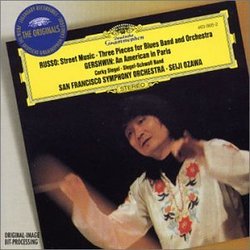| All Artists: William Joseph Russo, George Gershwin, Seiji Ozawa, San Francisco Symphony Orchestra, Corky Siegel Title: Russo: Street Music; Gershwin: An American in Paris Members Wishing: 0 Total Copies: 0 Label: Deutsche Grammophon Release Date: 7/16/2002 Genre: Classical Styles: Forms & Genres, Concertos, Theatrical, Incidental & Program Music, Historical Periods, Modern, 20th, & 21st Century, Symphonies Number of Discs: 1 SwapaCD Credits: 1 UPC: 028946366523 |
Search - William Joseph Russo, George Gershwin, Seiji Ozawa :: Russo: Street Music; Gershwin: An American in Paris
 | William Joseph Russo, George Gershwin, Seiji Ozawa Russo: Street Music; Gershwin: An American in Paris Genre: Classical
|
Larger Image |
CD Details |
CD ReviewsOzawa's Americana Robert E. Nylund | Ft. Wayne, Indiana United States | 10/24/2003 (5 out of 5 stars) "Seiji Ozawa brought new life to the San Francisco Symphony Orchestra during his tenure with the orchestra as music director, 1970 to 1977. The orchestra had been "rebuilt" under his predecessor, Josef Krips, who led the orchestra from 1963 to 1970, after nine years of decline due to ineffective leadership under Enrique Jorda. With Ozawa came youthful vitality, including some very innovative programming and strong, sound leadership. Those of us who were privileged to attend SFSO concerts under Ozawa (including this writer) have lasting memories of some very wonderful concerts.A product of Ozawa's relationship with the SFSO was its first recordings in 12 years. The orchestra had last recorded in January 1960, for RCA Victor, when the legendary maestro Pierre Monteux returned to guest conduct the struggling orchestra. They taped two romantic masterpieces, Wagner's "Siegfried Idyll" and Richard Strauss' "Death and Transfiguration." Enrique Jorda, music director from 1954 to 1963, made only a few recordings because the orchestra was having serious problems under his leadership. Josef Krips always said that the orchestra "wasn't ready" to record again during his seven years with the orchestra, despite some very fine broadcast performances over local station KKHI.Ozawa developed a close relationship with American composer William Russo that led to two world premieres of that composer's remarkable combinations of blues band and symphony orchestra. "Street Music" was one of the works premiered and it was an immediate "hit" with audiences and critics. Fortunately, Deutsche Grammophon decided to record this work at the Flint Center at De Anza College in Cupertino, California, where the orchestra gave some occasional performances. This is fun, very lively music and is a more modern counterpart to George Gershwin's use of jazz in symphonic compositions.Ozawa's rendition of Gershwin's "An American Paris" is particularly jazzy and well-performed. Due to the San Francisco Symphony's long relationship with Boston "Pops" conductor Arthur Fiedler, who frequently conducted the orchestra in summer concerts, the musicians were well-acquainted not only with Gershwin's music but some of the more upbeat arrangements of popular music. The versatility of the orchestra was seldom more apparent than in this wonderful performance of Gershwin's musical recollections of Paris in the 1920's." Russo is great Robert E. Nylund | 08/09/2002 (5 out of 5 stars) "William Russo is one of our great American contemporary composers. His music is lyrical and accessible (not atonal) and is thrilling to hear." A wonderful upbeat recording Lee Solomon | Sacramento, CA | 03/16/2005 (5 out of 5 stars) "This music may not be for everyone but for those who can appreciate something a little different William Russo's "Street Music" and "Pieces for Blues Band and Orchestra" are terrific semi-classical jazzy pieces. They mate well with "An American in Paris". If you like Gershwin's work you'll probably enjoy these works by Russo as well. Corky Siegel is the featured harmonica player and gives an awesome performance which is expertly captured by the DG technicians. Mr. Ozawa and the S.F. Symphony give a superb rendition of all 3 works and the recording is first rate. I own several versions of "An American in Paris" and can't really choose a favorite, it just depends on my mood. This is the most lively by far with lots of nuance in the playing.
This is my favorite all around album out of about 250 CDs which includes rock, pop, jazz, classical, country, swing and oldies." |

 Track Listings (8) - Disc #1
Track Listings (8) - Disc #1